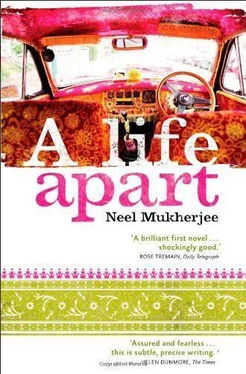This morning Bimala has been set a composition exercise — one page on the goddesses of Bengal, something that Miss Gilby thinks might inspire a spark in the jaded Bimala. Her head bent down on her book, Bimala passively fulfils what has been asked of her, occasionally asking the odd question on translation — ‘What is this?’ she asks, drawing an instrument that the goddess Durga holds in one of her ten hands and for which there is no translation in English except for the awkward and wholly unrepresentative ‘spinning discus’.
Seeing that dark head bent over paper, that slender hand forming the foreign letters slowly, much as a child does when it is learning to write, Miss Gilby feels a tightening in her chest. So pressing and sharp is the feeling that ignoring hundreds of years of refinement and social norms and rules, rules, rules, she moves over to Bimala, sits beside her, touches her shoulder and asks that enquiring, surprised face, ‘Bimala, if there is anything wrong, you know you can talk to me, don’t you?’
Bimala bursts into tears while Miss Gilby leaves her hand on the woman’s sobbing, heaving shoulder. Hot tears drop like candle wax on to the paper she has been writing on. With a rare clarity, Miss Gilby notes one smudging drop on the inverted word ‘learning’ and another poised between ‘lion’ and ‘demon’, about to spread out on either side and start disfiguring both.
Late that evening, a perplexed Miss Gilby, hearing the ‘rhubarb, rhubarb’ murmur of collected voices, looks out of her balcony to see scores of men gathered outside the front gate of the house. She at once guesses, rightly, that they are villagers demanding an audience with Mr Roy Chowdhury. She is both curious and concerned, but it wouldn’t do to look at these men from her vantage point two floors above them. Nor would it be right to try and find out what is happening by going downstairs. In any case, if she were to ‘accidentally’ eavesdrop, she would understand very little of the proceedings. She would have to stay in her quarters and be alert to the sounds and movements, or go down to find Bimala, possibly in the andarmahal . After half an hour of such deliberation, she picks up the book on birds she had found in Mr Roy Chowdhury’s study and prepares herself to go downstairs with it, on the fragile pretext of returning it to the collection.
By the time she reaches the long verandah off which lie the meeting room, Mr Roy Chowdhury’s study, the drawing room and the offices, the sound of voices has grown so loud — sometimes a single voice, at other times, many voices together, all talking at the same time, and occasionally, a veritable cacophony, with what seems like the entire gathering shouting — that there is no doubt this is an altercation, not just a heated debate or the deplorable Indian habit of talking loudly. Miss Gilby takes fright and turns around to mount the staircase up to the second floor but someone emerges from the meeting room and, in hasty confusion and the desire not to be caught loitering in a place where it could easily and naturally be thought she has no business to be, she does a double take and hurriedly crosses the courtyard, her heart thumping with guilt and relief at having avoided shameful exposure by the skin of her teeth. She reaches the verandah parallel to the one in which she was so nearly caught out. The rooms off this one are all dark, except one, which has such feeble candlelight emanating from it that one would have to let one’s eyes become dark-adapted before realizing that the room was a significantly lighter shade of the thick darkness everywhere. Miss Gilby decides to rush past that room and quickly take the stairs from the other direction.
As she passes the room, something, perhaps just natural human curiosity, or the bare hint of a sound, not so much heard as sensed, causes her to turn her head. What she sees roots her to the ground and makes her hair stand on end. In that dim firelight, more dark than light, with giant shadows flickeringly eager to devour the little of the room that is in the dirty yellow tallow light, Bimala and Mr Banerjea, the swadeshi revolutionary, are entwined in an amorous embrace, their mouths joined together in a communion of unspeakable passion.
Boarded up windows invariably remind Ritwik of gouged out eyes. A large number of houses in the back streets around King’s Cross look as if they have been forcibly blinded, with cheap plywood squares nailed into where windows once were. Abandoned buildings with broken windows; bold, swirling graffiti, mostly unintelligible, sometimes pure, riding form; detritus-blown streets: newspapers, empty cartons, kebab wrappings and takeaway boxes; train sheds with more graffiti in places one would have thought unreachable — in a different country, with different building materials, this would have been called a slum. This is a dead appendage of the urban monster, awaiting amputation or, as they call it here, regeneration. Every building and warehouse along these streets seems to have conspired with the other to induce instant depression and exude an unnameable threat. This is their only resounding achievement. Under the dull, gunmetal London sky, Crinan Street, Delhi Street, Randell’s Road, Bingfield Street, Goods Way, Camley Street, Earlsferry Way, all make suicide seem sensible, natural, even desirable.
At night, the drama changes. The dark hides the cracking plaster, the details of the decrepitude, and the emphasis moves from desolation to fear. These are the streets that everyone has learned to call ‘soulless’, ‘dangerous’, ‘crime hotspot’, but no word approaches the shadowy menace always out of the field of vision, always imminent, but never realized. Add to that the impoverishment, this interminable locked-in dance with squalor, and the mixture explodes in little tingles in the skin’s pores as you walk down these streets.
Of course, like most of the others who hover here, those who do not hurriedly walk down, Ritwik has learnt to live with the fear, at times finding it somewhat erotic, a conditioned reflex from his cottaging nights. The creatures here dart in and out of shadows. They are creatures of fishnet stockings, high heels, cigarette smoke, impossibly short skirts, the careless glitter and dazzle of sequins and tawdry shiny stuff — fake zari , he thinks — and garishly applied lipstick, eye make up, concealer. Or so he imagines, because he has never actually come close enough to see their Otto Dix faces and their harlequin make up, except for split second glimpses of mouths, which look like bleeding gashes in the unforgiving light of the intermittent sodium vapour lamps that cast more gloom in a pool right at their bases than light around them.
The stretch off York Way on which Ritwik usually walks is called the ‘Meat Mile’. Not that it has got them hanging off hooks, but if one is minded that way, there is plenty available, provided a police car is not cruising by at irregular intervals, or another crackdown on kerb-crawling not taking place. The main thing is knowledge, adherence to codes that to the untrained eye might be invisible. A certain type of aimlessness thrown into one’s gait, being seen on the same alley or lane more than once, a few glances sideways and backwards — Ritwik knows all of these with practised ease. It’s what they say about swimming, that you never forget it, that it’s muscle memory; these codes are written into his veins and arteries. He can read a customer, either his kind or the more numerous and more frequent other type, from the sound their shoes make on the pavement, from the shadows they cast on the occasionally syringe- and ampoule-strewn streets.
And then there is the other fear, the fear that he is a freak here, the break from the norm expected in the ‘Meat Mile’. Two weeks ago he had heard a fat woman, all skimpy shawl and enormous breasts almost totally exposed except for a precariously tied piece of glittering cloth on her nipples, spit out the words ‘Fucking queer’, her gobbet of spit landing with a loud ‘splat’ near her, before disappearing into the darkness that is always stalking one here.
Читать дальше












